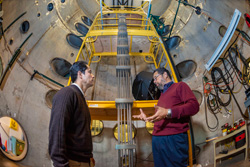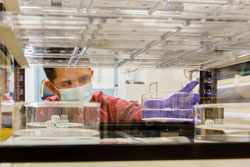ALBUQUERQUE, N.M. — For responding with innovative solutions during the pandemic, developing solar cell and hydrogen research technology, and creatively working with companies, Sandia National Laboratories won six prestigious regional 2020 Federal Laboratory Consortium awards.
The awards for the Mid-Continent and Far West regions put a spotlight on Sandia successes in transferring technology, partnerships and licensing. In addition, Sandia was honored with the Regional Laboratory Award for rapidly responding to COVID-19 challenges in order to help mitigate threats to the U.S. and its economy.
“During this unprecedented year, Sandia was able to demonstrate our continued commitment to developing innovative technology and partnerships that help secure our nation’s future,” said Mary Monson, senior manager of technology partnerships and business development at Sandia. “While some of the awards recognized years-long partnerships and progress, Sandia was also recognized for our ability to step up in a time of crisis to deploy licenses quickly during the pandemic, and work with companies on COVID-19 projects. We are very proud of the work we do at the labs and we are pleased the consortium celebrated our efforts.”

University of Puerto Rico, Mayagüez, electrical engineering professor Efrain O’Neill, left, talks energy research with Tito Bonano, a senior manager at Sandia National Laboratories, before the COVID-19 national emergency declaration. O’Neill is currently working at Sandia through December. The labs received a Partnership Award for collaborative research with UPRM over the last two decades. (Photo by Randy Montoya) Click the thumbnail for a high-resolution image.
The consortium recognized Sandia for:
- Developing a new Rapid Technology Deployment Program for licensing Sandia intellectual property and assisting companies working on COVID-19 projects through the New Mexico Small Business Assistance program.
- A continued partnership with the University of Puerto Rico, Mayagüez, which continues to focus on bringing more reliable electricity to remote communities.
- Deploying technologies developed at Sandia to companies with the guidance and creativity of licensing expert Bob Westervelt.
- Transferring technology to BayoTech, a New Mexico company that envisions local production of hydrogen as a way to reduce the costs and help the country transition to hydrogen fuels which are better for the environment.
- Transferring small solar cell research to mPower, a New Mexico company that continues to advance the technology for use in homes, everyday objects and most recently a small satellite.
- Developing a technology called ducted fuel injection that could reduce soot emissions coming from diesel engines.
The Federal Laboratory Consortium is a network of more than 300 federal laboratories, agencies and research centers. The awards are ranked as some of the most respected honors for federal laboratories and partners that demonstrate outstanding technology transfer achievements.
Sandia is being recognized at virtual awards ceremonies this week during the consortium’s Far West/Mid-Continent Regional meetings.
Sandia partnerships group, researchers addressed COVID-19 challenges
When the country faced the COVID-19 pandemic, Sandia created solutions to help companies through licenses and projects, Monson said. For these efforts, the consortium awarded Sandia with the Regional Laboratory Award.
Right after a national emergency due to the COVID-19 pandemic was declared on March 13, a new employee came up with an idea for the Rapid Technology Deployment Program, which made Sandia patents freely available to U.S. companies through a speedy process. The program opened about 75% of Sandia’s intellectual property portfolio, and free licenses can be issued in two days.
“Other national laboratories have since adopted Sandia’s program and licenses continue to be available,” Monson said. “There have already been 14 licenses, including 29 patents, signed in the months since the program began.”
The New Mexico Small Business Assistance program also rapidly mobilized to provide assistance to companies with COVID-19-related product development challenges, and the projects were fast-tracked through the system. Researchers helped a Santa Fe distillery test hand sanitizer when the product was in short supply in stores everywhere.
Sandia also helped Albuquerque medical device manufacturers test materials used in N95-like respirators, and another team worked on ways to extend the shelf life of a vaccine candidate which would provide benefits to parts of the world where refrigeration is not always available.
“Our researchers really stepped up to address challenges in a critical time of need,” Monson said.

Sandia National Laboratories principal investigator Michael Omana tested materials for Albuquerque companies looking to manufacture N95-like respirators. Sandia received a Regional Laboratory Award from the Federal Laboratory Consortium for rapidly creating solutions and programs during the COVID-19 pandemic. (Photo by Bret Latter) Click the thumbnail for a high-resolution image.
Decadeslong partnership, new agreements lead to award
Sandia received a Partnership Award for its collaborative research with the University of Puerto Rico, Mayagüez, over the last two decades. In 2016, collaboration was strengthened with the establishment of a summer internship program and subsequently a faculty fellowship program that the university participates in. Late last year, Sandia and the university signed a Cooperative Research and Development Agreement. The partnership’s focus has been on developing safe, secure energy and environment projects for resiliency and reliability.
Specific areas of collaboration include re-electrification of remote communities and development of next generation microgrids for rural and vulnerable communities. An additional research focus will examine the life cycle of energy components and systems from production to use and final disposition.
Sandia expert provides valuable assistance, creativity in licensing process
The consortium honored Westervelt, a Sandia licensing expert, with an Outstanding Technology Transfer Professional Award. Westervelt brought unique experience to the labs as he has been on both sides of licensing, Monson said. With a doctorate in nuclear physics and experience in the private sector, his skills are ideal for understanding the value of intellectual property and negotiating complex licenses.
Westervelt develops creative licensing solutions which have led to a license focused on enabling technology for medical isotopes, a licensing plan for New Mexico company BayoTech to sell on-site hydrogen production units, and a license to allow companies to provide training for free emergency response software. He has also developed licensing templates used for Sandia’s technology transfer program and trained staff on best practices. A Sandia concept called High Value Licensing can be attributed to Westervelt; it helps staff analyze and articulate the value of licensing efforts.
“Value is not only measured as income,” Westervelt said. “Benefits to the public and the U.S. economy are also important.”
Sandia hydrogen generation technology used for on-site production
Sandia received an Excellence in Technology Transfer Award due to the success of licensing high-efficiency hydrogen generation technology to BayoTech, a New Mexico company that developed a solution for on-site production of low-cost, low-carbon hydrogen.
BayoTech’s modular, scalable and rapidly deployable generators produce hydrogen at the point of use, eliminating the cost and carbon emissions associated with liquification and transportation.
“Hydrogen will be a key enabler for the global energy transition,” said BayoTech Director of Research and Development Robert Moore. “BayoTech’s high-efficiency hydrogen generation technology provides a consistent, cost-effective supply of low-carbon hydrogen that can power zero-emission transportation, decarbonize industry and accelerate the transition to a clean energy future.”
DragonSCALES moves into space sector
Sandia received an Excellence in Technology Transfer Award for developing microsystems enabled photovoltaics, a technology that was transferred to mPower. The invention uses micro design and microfabrication to make miniature solar cells.
Former Sandia scientist Murat Okandan left the labs to start mPower and licensed the technology to commercialize it as DragonSCALES, now being manufactured for national security and energy applications. Its small size reduces material costs while enhancing cell performance, potentially in buildings, homes, clothing, portable electronics, vehicles and more.
The company is currently engaged in the space solar power market. According to Okandan, DragonSCALES has been integrated on a small satellite for an in-orbit demonstration scheduled to launch in December.
New technology dramatically reduces diesel engine emissions
Sandia won an Outstanding Technology Development Award for its work on ducted fuel injection, a patented technology that slashes emissions of soot and nitrogen oxides from diesel engines by about 80% and is synergistic with sustainable liquid fuels like biodiesel.
According to Charles Mueller, who leads the project, ducted fuel injection is a simple, mechanical solution that involves installing tubes inside a diesel engine’s combustion chamber. Passing each fuel spray through a tube enhances entrainment and mixing, leading to lower soot production than when fuel is sprayed unconfined into a chamber. The lower soot levels enable the use of an existing, cost-effective approach to simultaneously attenuate emissions of nitrogen oxides.
Sandia was awarded a Department of Energy Technology Commercialization Fund project in 2018 to advance research on ducted fuel injection. The Sandia team is currently seeking commercial partners to further develop the technology.
Sandia National Laboratories is a multimission laboratory operated by National Technology and Engineering Solutions of Sandia LLC, a wholly owned subsidiary of Honeywell International Inc., for the U.S. Department of Energy’s National Nuclear Security Administration. Sandia Labs has major research and development responsibilities in nuclear deterrence, global security, defense, energy technologies and economic competitiveness, with main facilities in Albuquerque, New Mexico, and Livermore, California.
Sandia news media contact: Manette Fisher, mfisher@sandia.gov, 505-238-5832